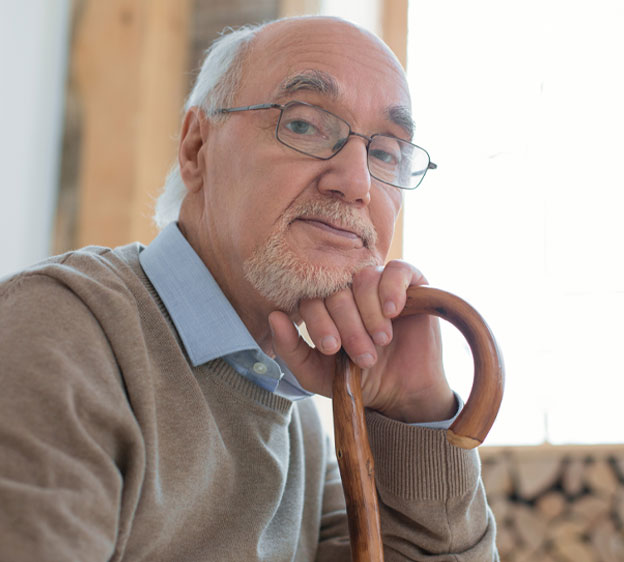
Difficulty urinating is a vexing — and perplexing — problem for many men. Having trouble starting urination or maintaining a consistent flow while urinating can affect you at any age, but you’re more likely to experience it the older you get.
Read More: More Than Half of Older Men Face Prostate Issues
What Can Cause Difficulty Urinating?
Nearly all older men experience some form of difficulty urinating, according to the National Institutes of Health. For many of these men, the cause is a tiny gland near the bladder that helps produce semen — the prostate.
“The prostate typically enlarges as men age, which is called benign prostatic hyperplasia (BPH),” says Dr. Jonathan Briggs, a board-certified radiologist and radiation oncologist at Beaufort Memorial Radiation Oncology. “The prostate surrounds the urethra, which carries urine from the bladder out of the body. An enlarged prostate can squeeze the urethra and make it more difficult for urine to pass through.”
A noncancerous condition, BPH is one of the most common causes of difficulty urinating. You have a higher risk for BPH if you:
- Are age 40 or older
- Are inactive
- Have a family history of BPH
- Have certain health conditions, including erectile dysfunction, heart disease, obesity and Type 2 diabetes
Treatment for BPH often starts conservatively. Your primary care provider (PCP) or urologist may recommend lifestyle changes, such as drinking fewer liquids or learning to hold urine longer. You may also need to take medications to improve your ability to urinate or to shrink the prostate. If conservative options don’t succeed, several surgical options — many of which are minimally invasive — are available to remove part of the prostate or expand the urethra.
When Difficulty Urinating Is a Sign of Something More Serious
You should speak with your PCP any time you experience an abnormal urinary symptom because the best way to know if urination difficulties are serious is by consulting your PCP, who may refer you to a urologist.
“Difficulty urinating can be a sign of prostate cancer, but BPH is the likelier cause in most men,” Dr. Briggs says. “Prostate cancer typically causes symptoms only when it’s advanced.”
In addition to BPH, other conditions can cause difficulty urinating, including:
- Chronic prostatitis. Prostatitis is inflammation of the prostate, and chronic prostatitis is the most common type. Unlike other types of prostatitis, which are caused by bacteria, chronic prostatitis’ cause is unknown. You are more likely to develop this condition if you’ve had nerve damage in the lower urinary tract. Treatments include medications, such as anti-inflammatory medications, heat therapy and physical therapy.
- Prostate cancer. Only skin cancer is more common among men than prostate cancer, according to the American Cancer Society. Prostate cancer rarely provides any warning signs, such as difficulty urinating, during its early stages. Ask your PCP whether you should be screened for prostate cancer based on your age and risk factors, such as a family history of the disease. If you’re diagnosed with prostate cancer, your medical team will create a treatment plan that may include surgery, radiation therapy, chemotherapy or other options.
Read More: Prostate Cancer Screenings: The Facts
Other Prostate Health Warning Signs
Difficulty urinating isn’t the only way your prostate may warn you that all is not well. Other symptoms that can indicate a prostate problem include:
- Abnormally frequent urination
- A burning feeling during urination
- Frequent urination at night
- Loss of control over urination
- Pain during or after urination or ejaculation
- Pelvic pain
- Urine that has an abnormal smell or color
Read More: African American Men and Prostate Cancer
How You Can Help Your Prostate
Researchers have not found a way to prevent many prostate conditions, but it may be possible to reduce your risk for one of the most serious — prostate cancer. Certain risk factors, such as age and a family history of prostate problems, are out of your control. Adhering to the fundamentals of a healthy lifestyle, however, may help prevent prostate cancer.
“Being overweight or obese may increase your risk for certain types of prostate cancer,” Dr. Briggs says. “Maintaining a healthy weight may lower your risk. You can do that by exercising regularly and making healthy dietary choices, such as eating lots of fruits, vegetables and whole grains, and eating less red meat and fewer processed foods.”
Your PCP can help you maintain prostate health and refer you to a urologist if needed. Find a PCP accepting new patients.

